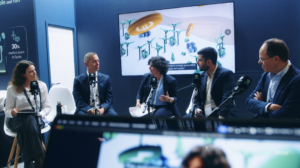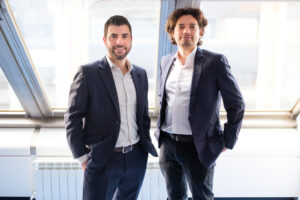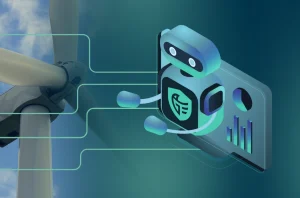Three years ago, Green Eagle Solutions surprised us when they developed the control centers of Vestas and Innogy in Spain, being both validated as delegated offices according to the Spanish TSO (REE). It was pleasing for us to discover that a Spanish company, founded by IT engineers Alejandro Cabrera (Cádiz) and Juan Fernández (Sevilla), was competing within such a specialized and competitive sector, which is usually ruled by Anglo-Saxon and northern Europe companies. Today, we are happy to know that they have consolidated themselves as one of the greatest experts in SCADA systems and represents the spearhead in the renewables sector digitalization process, as it has been proven in recent international forums such as Wind O&M EU 2019 and WindEurope Conference & Exhibition Bilbao 2019. This is why we consider it is an appropriate time to talk with Alejandro Cabrera, CEO, about the present and future of renewable energies.
As a company that provides software solutions for the renewable sector, which do you consider to be the main challenges within the sector?
During the last few years, there has been a noticeable tendency of reduction in LCOE (Levelized Cost Of Energy) for renewable energy projects all around the world, moving beyond public subsidy schemes and into competitive auctions and bilateral PPA contracts for private energy purchase, or even power plants that go into the merchant market. This surprising and defying evolution within the sector of renewable energies has obliged the different role-players such as OEM, IPP, EPC and ISPs to adjust their work procedures looking for the most efficient process. In order to achieve this, we believe it is necessary to increase the standardisation in elements and configurations of facilities in order to optimise operation and maintenance processes in wind farms and solar plants. All focused in increasing efficiency whilst reducing costs.
On the other hand, we face an important challenge concerning cybersecurity in facilities. For example, when we visit wind farms in order to perform an audit of SCADAs, we find that operating systems are not being updated and therefore are not following the basic standards in IT security such as communications encryption or solid password policies. This results in wind turbines and plants exposed to all kinds of attacks as we have seen in the US. We must take seriously all inherent risks for critical infrastructures such as renewable facilities and control centers to avoid any existing vulnerabilities.
In this sense, what is the role of digitalization in renewable facilities?
The sector’s digitalization must help to homogenize operations amongst different technologies plants given that, nowadays, we find facilities that are equipped with SCADAs from different technologists, obsolete in many cases, and from which it is difficult to acquire reliable data.
We believe digitalization will transform the way wind farms and solar plants are operated. Data becomes more and more valuable and we will now be able to implement new operational strategies for lifetime extension, perform spot market based operations or even manage hybrid wind+solar+storage facilities.
Another challenge of digitalization is to integrate most of the tools that companies are currently using for operation, financing and maintenance management in a single integral solution, or finding a way to interconnect them all. This is what we are working on with our monitoring and control of SCADAs platform, which allows you to integrate wind farms and solar plants with different technologies, to unify data coming from different sources in a single database and to integrate specific widgets to analyse plant availability according to IEC standards, energy losses and wind turbine operational efficiency. The final objective of this platform is to provide different user profiles, according to their role within the company, with quick and direct access to real time information and critical analysis KPIs during their day by day performance. In addition, and due to the platform’s flexibility, we can integrate data from any external source which might be of interest to the client as well as third-party systems that were already in use.
During the last year we have seen Green Eagle increasingly present in sectoral international events. At what stage is Green Eagle currently in terms of international development and which markets do you consider to be of greater interest nowadays?
Certainly, Green Eagle’s process of internationalization began less than a year ago and, during this time, we have begun to work in such distant markets as the US, Indonesia or India, as well as more proximate countries such as the UK, Ireland, France and Italy. Green Eagle’s vocation is to become a reference to a global scale in terms of renewable energy SCADA solutions provider and this is why our commitment to international markets is firm and strong.
In relation to your question about which markets we consider to be of higher interest, firstly we are working to consolidate our presence in Europe. Germany, Poland and the Baltic countries are objectives where we are already developing our business and we hope to achieve results soon enough. However, we do not dismiss new opportunities in other continents whether they are direct or through our partners.
In short, wherever there might be a renewable plant SCADA system with problematics, Green Eagle Solutions has the capacity to solve it.
During the last international sessions on operations and maintenance, you have presented various different cases where you have succeeded to automate the operation of control centers in renewable facilities thanks to the application of your technology. What are the most immediate benefits and what improvements can be obtained in short and medium term?
Automating operational protocols by using AI tools impacts positively in reaction times of control centers as well as in the way operators perform. In addition, it allows for the design of more complex financial and O&M strategies.
The most immediate results are the reduction of unavailability periods. Usually, the average reaction time for a control center operator is around 10 minutes. By automating the operational protocols we can reduce this time to just seconds.
This way, the control center responsible can apply a tool that reinforces all his experience and that allows him to dedicate more time to analysing and improving operational protocols. It also encourages him to implement more complex control strategies that might depend on external variables which influence in real time the operational strategies of wind farms, and which are out of reach for traditional operational methodologies. For example, integrating information such as market prices or certain operational restrictions related to environmental issues in order to improve and develop a more detailed remote operational set of protocols.
Green Eagle provides solutions in three business areas: Maintenance, Retrofit and 24/7 Technical Support for OEM SCADAs; Monitoring and Control Platform SCADA (1st and 2nd level); and CompactSCADA® Smart Energy Control Center. Which is your value proposition in comparison to other sectoral software companies?
In my opinion, one of the aspects that differentiates us from others is that we cover all the value proposition related to SCADAs, from their maintenance to the automation of protocols going through monitoring in plant and control center. We are a software company, but we know the problems the O&M responsibles face because we “step on” the facilities. This is why our value proposition can be summarized as follows: we do not understand a product without its associated service, and in this way, I believe our service complements our product in such a way that it becomes a fundamental part of it. Our clients buy our product because they have a necessity, but they become loyal customers when they can count on a close and attentive team that helps them with their day by day problems.
From your Maintenance and 24/7 Technical Support department for SCADA systems in Sevilla you give support to more than 2.400 MW total installed power. What takes your customers to hire this service? And from your point of view, when presenting this service, what is the greatest challenge you are facing?
When they hire our Maintenance and 24/7 Support service, our clients are looking for a guarantee of availability and optimum performance of their SCADA systems. Our service proposal in this sense defines truly demanding service accomplishment thresholds which are only achievable through a software and hardware maintenance planning based in prevention. In other words, the final objective of this service, its goal and at the same time its greatest challenge, is to avoid the generation of incidents related to the SCADA.
You are a company with a strong growth trajectory during the last few years, what are your future plans?
Green Eagle Solutions has the vocation of becoming a world reference within the field of renewable energies applied software technology. We want to help in the digitalization of the sector by giving support to owners and operators of wind and solar energy facilities in the relevant role they play in the planet’s decarbonization. We are convinced we can work and compete with other countries from Spain, whether they are American, European or Asian, within a global market which is more and more competitive each day, and we aspire to make our platform for monitoring, analysis and control a global reference. Furthermore, we are working to make our CompactSCADA® Smart Energy Control Center service outstand in terms of remote operations for wind farms and solar plants.
Moreover, and thanks to our experience and recognition of our consulting team/ SCADA retrofit OEM, as well as our maintenance and 24/7 support OEM SCADAs service, we are expanding our customer portfolio to Independent Power Producers (IPP) and Independent Services Provider (ISP). And, even though it might sound pretentious, the sector already considers us as a reference in problem and necessity resolution related to old or obsolete SCADAs, which is and will keep on being a necessity for the industry.





